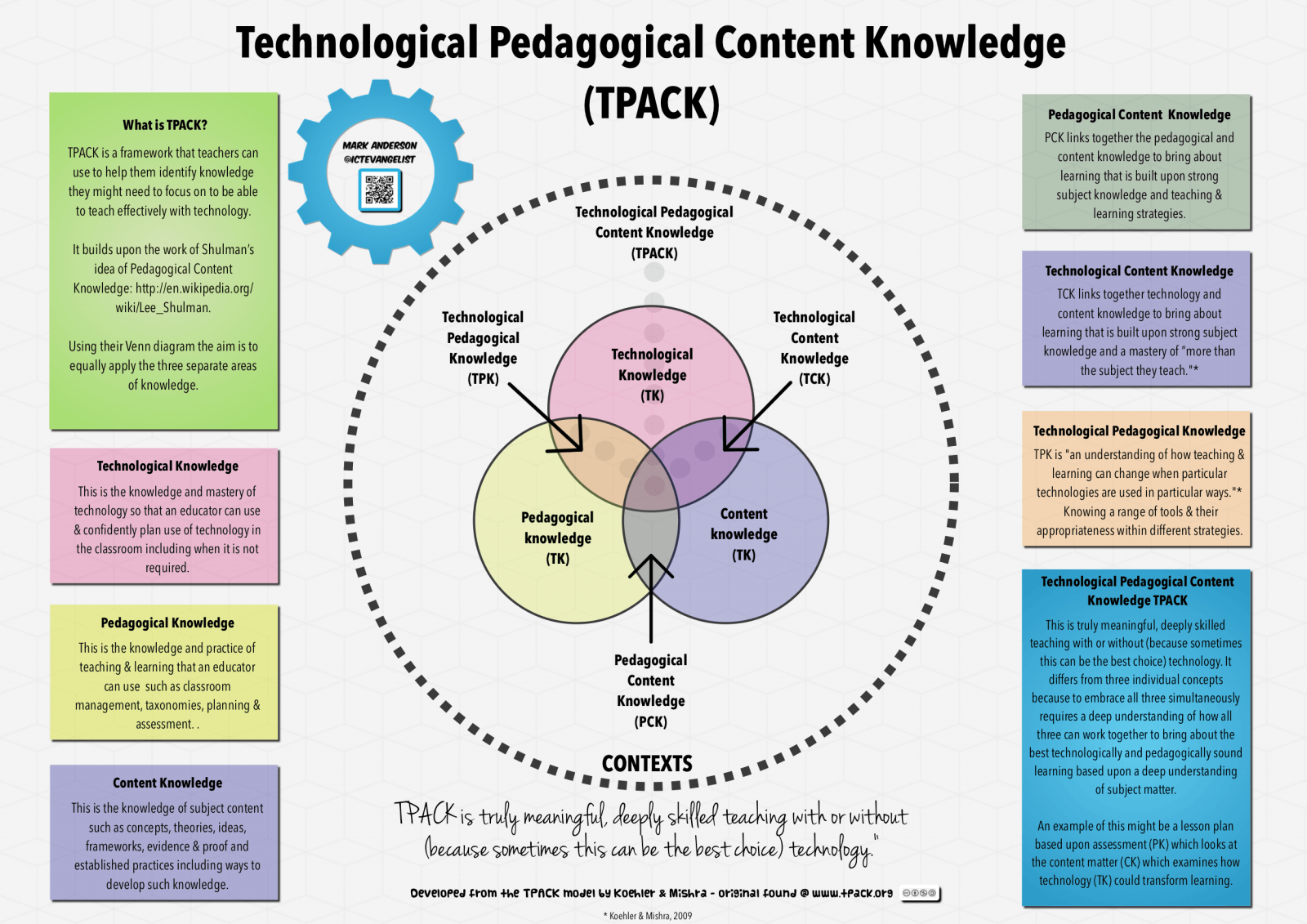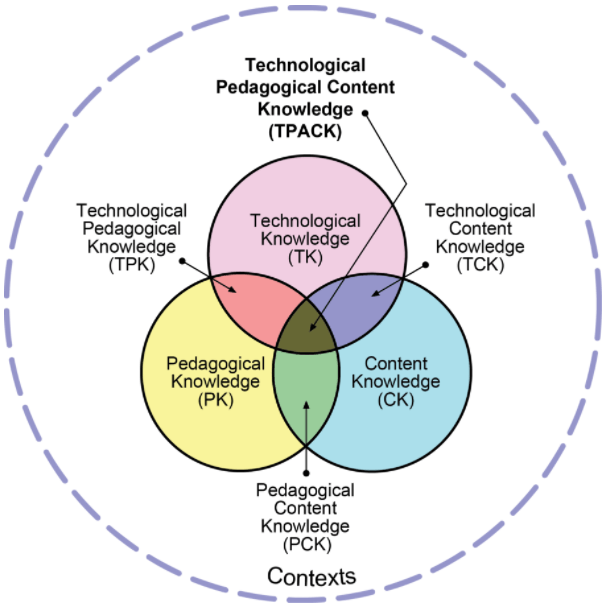The TPACK graphic is compelling. The complex relationship between the demands of teaching are well represented. And ideally balanced. The overlapping sweet spots are easily pictured by experienced educators.
How I See TPACK
The nature of my job is that I see many teachers in the overlap area Technological Content Knowledge (TCK). These teachers are often interested in technology as a delivery mechanism for content. Other times I work with subject matter experts who build content. I am often present for the technical support, but I also want to talk about pedagogy. I do not want to build technical containers of content without respect to appropriate pedagogy. Sometimes teachers wonder why.
However, in my role I am a Technological Pedagogical Knowledge practitioner (TPK). I am an expert in the Technological and Pedagogical areas, but intentionally neutral in content.
Not all teachers training on technology are opposed to pedagogy. Likely, many have not considered a balanced approach such as TPACK. Possibly they have not been introduced to the concept of TPACK. The benefits of connecting all three knowledges into one framework could help them consider how they may teach in a blended learning format, it may help them integrate technology more thoughtfully, or it might help them value team members who have gifts in equally important areas.

Awesome creation/think piece above by: Mark Anderson ~ @ICTEvangelist ~ ictevangelist.com
How You See TPACK
If I asked you which one area of TPACK is most ignored, what would you say? One area seems more acceptable to neglect than others. In spite of the great technology advances, I see many teachers teaching the same way I was taught, Technology-free. There is enough blame for Technological Knowledge marganilization to go around. The various reasons are too many for this post, but the consequences are a worthy topic.
What happens when you neglect Technological Knowledge?
Expecting a student to improve 21st century skills while not allowing them to learn with technology is insincere at best. Students do not develop their personal technology repertoire without guidance and practice. And teachers do not break out of a traditional teaching model.
A learning disruption where authority transfers from the teacher to the world is not a clean transition, but often messy. Technology means teachers can deliver content to students in a customized manner; the Internet searches everything, but students have to know how to search well and to manage their resources. Not all classrooms cultures can shift that dramatically so fast. Many teachers need to fill gaps and change expectations for who owns the learning before moving into Technological Knowledge being part of the learning. Without that disruption, teachers do not have tools which make the classroom less passive and more participatory.
Teaching content without technology is an intentional act. For specific purposes this makes sense. However, those specific, isolated lessons are not the expected default. The default needs to include access to the same information the rest of the world accesses daily.
To isolate your pedagogy from technology is to risk your professional growth and the agility of your students to work through technology.
Why do teachers neglect Technological Knowledge?
Remember that the leaders of the school come with different school experiences than teachers under their leadership. While age is not the sole determinant of technological aptitude, it often correlates to the amount of background experience with technology in education. Who has educated the principals in educational technology, current theories of asynchronous education, or blended learning? Likely no one. And those leaders are hard-pressed to lead teachers in anything in which they have little experience.
With unclear leadership expectations teachers are unlikely to invest a huge effort in any initiative which is ill-defined. And even less inclined to follow through on one to which they are not accountable. We all rise to the level of our expectations.
While there are the teachers who are willing teach themselves, how will we move the rest forward? The rest need training, training the district/school leaders can organize.
What about training?
Teachers need training to incorporate Technological Knowledge. It is not like the content training they likely received in college. It is not like the pedagogical knowledge they read about in college and then apply in classrooms. This training ranges from small, details of how to accomplish something in one application to the big ideas of asynchronous learning.
Protected training time before bringing in the content signal to teachers the priority placed on this.
Would we allow those without Pedagogical or Content Knowledge to work for very long in classrooms?
What makes Technological Knowledge so different?






2016-12-12 at 9:23 am
Excellent post! I think in a lot of ways, we have very similar views on the use of TPACK, although, for sake of ease at this point, we are looking to introduce staff to the SAMR model first. In my opinion, it is the one that is easiest to digest and start the conversation for meaningful technology integration in the classrooms. Once we reach a point where we are starting to see more “meaningful” technology use in the classroom, then we will start to examine how it is being used. I think that for our teachers’ sake, we need to start with something that is much more approachable.
As for the part the I leave out, it also tends to be the content knowledge piece, but I will admit it is not always intentional on my part (I haven’t touched some of the material that I see since I was in the grades in which it is being taught).
I totally agree with the isolation of technology from pedagogy is harmful to teachers’ (and administrators) professional growth. What if Colleges of Education started to require a technology course before entering the classroom? I think that if that became a focus it would help. Although teachers entering the professional now are more technologically ready, I think there is a disconnect like their is with our students. While they may be “digital natives,” they tend to consume more digitally. I believe there should be a focus on how to use the technology in the classroom!